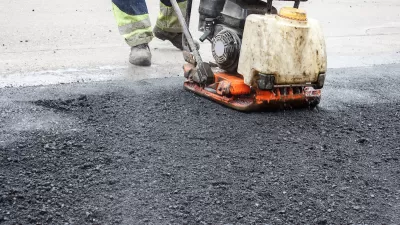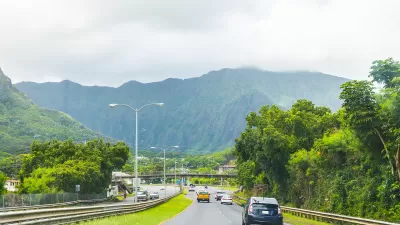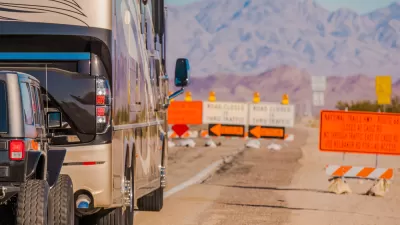Texas State Rep. Joe Pickett faults a recent TRIP report for not recommending a funding strategy to address the state's revenue shortfall for transportation needs. Two groups view vehicle registration fees as a funding option.
Nick Swartsell writes how a key state representative, a transportation advocacy group, and an influential business association have received TRIP's report, Future Mobility in Texas: The Cost of Meeting the State's Need for Safe and Efficient Mobility (PDF). TRIP, a D.C.-based non-profit transportation research group "is sponsored by insurance companies, equipment manufacturers, distributors and suppliers, businesses involved in highway and transit engineering and construction, labor unions, and organizations concerned with an efficient and safe surface transportation network." [I could not find what the acronym stands for].
State Rep. Joe Pickett, D-El Paso, who sits on the House Transportation Committee, says the TRIP report is not a revelation, citing similar studies by the Texas Department of Transportation and other organizations. "They still don't address the main issue," Pickett said, "and that's how we're going to pay for it." Pickett says that the lack of public awareness and an unwillingness to take some politically unpopular actions are the main reasons for funding shortfalls.
Lawrence Olsen, executive vice president of Texas Good Roads, an 80-year-old advocacy group composed of "business people, community leaders, chamber of commerce members, professionals and transportation experts," and not affiliated with the TRIP study, noted "that major revenue sources for the highway fund haven't been update [sic] to reflect increased road usage. Olsen cited the vehicle registration fee, which was last increased in 1985, and the motor fuels tax, which was saw its last bump in 1991."
"In a statement released (Oct. 2), the Texas Association of Business said it would push for a $50 increase in the fee motorists pay to register a vehicle in Texas during the upcoming legislative session. It suggests the revenues raised by this increase could be leveraged to raise $16 billion in bonds for road improvements.
TAB CEO Bill Hammond said in the statement, "if you look at the TRIP study the cost of doing nothing is far higher. We see the registration fee increase as the only real alternative right now."
The state's transportation funding crisis will be addressed at the state Transportation Summit on Oct. 18. Organizers are well-aware of the funding shortfall, as they note in the Summit's description.
"Texas is facing a transportation crisis. The state will run out of money for new roads by September 1, 2013. We will only have enough money to maintain the roads we already have, and we will soon run short of money to even do that. Gas taxes no longer cover the dollars needed. We are adding over 30,000 new vehicles to Texas roads every month."
Thanks to Len Conly
FULL STORY: Study: Inadequate Roads Cost Texans Billions

Alabama: Trump Terminates Settlements for Black Communities Harmed By Raw Sewage
Trump deemed the landmark civil rights agreement “illegal DEI and environmental justice policy.”

Planetizen Federal Action Tracker
A weekly monitor of how Trump’s orders and actions are impacting planners and planning in America.

The 120 Year Old Tiny Home Villages That Sheltered San Francisco’s Earthquake Refugees
More than a century ago, San Francisco mobilized to house thousands of residents displaced by the 1906 earthquake. Could their strategy offer a model for the present?

In Both Crashes and Crime, Public Transportation is Far Safer than Driving
Contrary to popular assumptions, public transportation has far lower crash and crime rates than automobile travel. For safer communities, improve and encourage transit travel.

Report: Zoning Reforms Should Complement Nashville’s Ambitious Transit Plan
Without reform, restrictive zoning codes will limit the impact of the city’s planned transit expansion and could exclude some of the residents who depend on transit the most.

Judge Orders Release of Frozen IRA, IIJA Funding
The decision is a victory for environmental groups who charged that freezing funds for critical infrastructure and disaster response programs caused “real and irreparable harm” to communities.
Urban Design for Planners 1: Software Tools
This six-course series explores essential urban design concepts using open source software and equips planners with the tools they need to participate fully in the urban design process.
Planning for Universal Design
Learn the tools for implementing Universal Design in planning regulations.
Clanton & Associates, Inc.
Jessamine County Fiscal Court
Institute for Housing and Urban Development Studies (IHS)
City of Grandview
Harvard GSD Executive Education
Toledo-Lucas County Plan Commissions
Salt Lake City
NYU Wagner Graduate School of Public Service





























